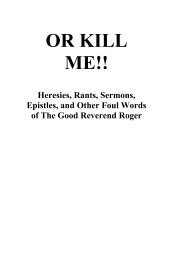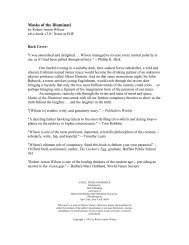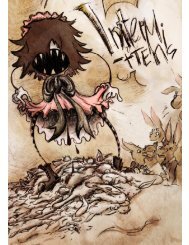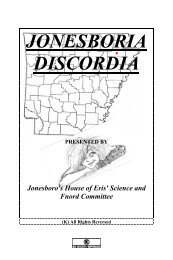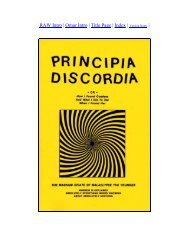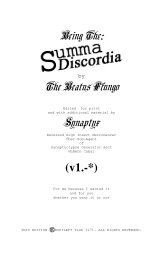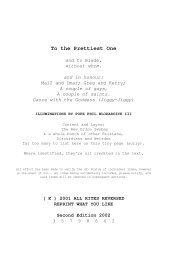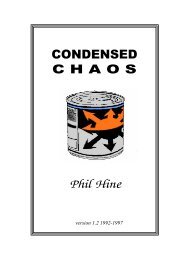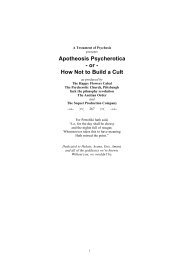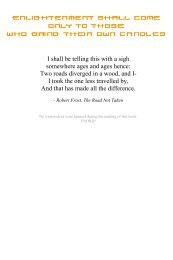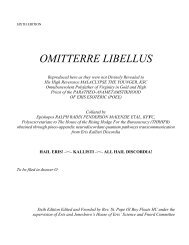Coincidance - Principia Discordia
Coincidance - Principia Discordia
Coincidance - Principia Discordia
Create successful ePaper yourself
Turn your PDF publications into a flip-book with our unique Google optimized e-Paper software.
COINCIDANCE 51<br />
in the 11th and 12th centuries. Ideas from the Sufis and other Arabian<br />
mystics began to find an audience. The sexual doctrines of the Sufis,<br />
involving semiritualized intercourse with a beloved female as a specifically<br />
religious act, found a particularly enthusiastic support in certain circles—and<br />
have gone on to influence the vocabulary of our poets ever since, as Ezra<br />
Pound first demonstrated in his Spirit of Romance and as Denis de Rougemont<br />
has shown at even greater length in Love in the Western World.<br />
Overtly, the new spirit began with Eleanor of Aquitaine, whose reputed<br />
bare-breasted ride through Jerusalem may or may not have actually<br />
happened, but has been widely believed for centuries. This was in many<br />
ways a historical turning point, and obviously much more was involved<br />
than a mere prank. At the very least, she showed a great sense of<br />
appropriate symbolism. Eleanor seems to have cherished both her beauty<br />
and her intellect and could not be persuaded by any male priesthood of a<br />
male god that she should hide either. (There were no Marxian feminists<br />
around to tell her she was making herself a "sex object.") She also seems to<br />
have convinced a large segment of the French nobility that love is a greater<br />
sport than war and that a man who wrote love poems was more virile than a<br />
conqueror of cities. This led to the outbreak of Provencal "troubadour"<br />
poetry and the similar verse of minnessingers in South Germany, along<br />
with the famous "Courts of Love" in which subtle points of sexual etiquette<br />
and romantic decorum were taught. The cynical remark that "love was<br />
invented in the 11th Century" is not true, but it is emphatically true that<br />
most of our modern ideas about love were invented then, largely due to<br />
Eleanor's influence. A song about her—<br />
J would give the whole world<br />
From the Red Sea to the Rhine<br />
If the Queen of England tonight<br />
In my bed were mine<br />
—has survived eight centuries and was recently set to modern music by<br />
Carl Orff as part of his popular "Carmina Burana" suite. Actually, after<br />
becoming Queen of England Eleanor had a rather wretched old age. Her<br />
husband, Henry II, a jealous type, put her under house arrest in a rather<br />
lonely castle and firmly ended her personal involvement with the cultural<br />
revolution she had instigated.<br />
The revolution, however, continued. The troubadour cult of love became<br />
a powerful rival to the church's cult of ascetism and the feudal lords' cult of<br />
war; the role of women was steadily elevated—and, as Ernest Jones pointed<br />
out in his psychoanalytical history of chess, the role of the queen on the



